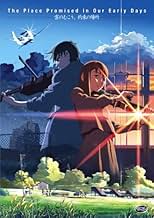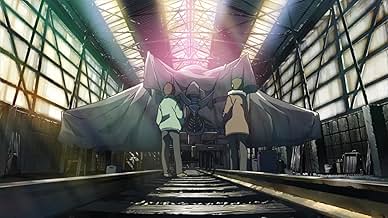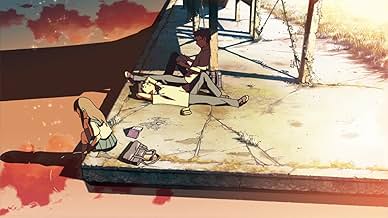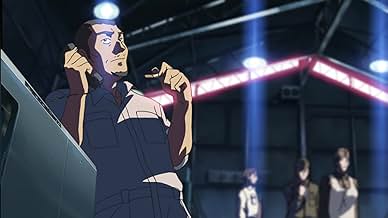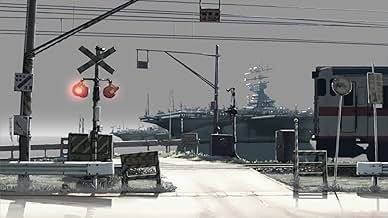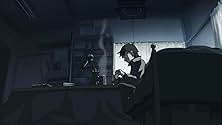IMDb रेटिंग
6.8/10
16 हज़ार
आपकी रेटिंग
एक वैकल्पिक युद्धोत्तर समयरेखा में, जापान संघ-नियंत्रित उत्तर और अमेरिका-नियंत्रित दक्षिण में विभाजित हो गया है.एक वैकल्पिक युद्धोत्तर समयरेखा में, जापान संघ-नियंत्रित उत्तर और अमेरिका-नियंत्रित दक्षिण में विभाजित हो गया है.एक वैकल्पिक युद्धोत्तर समयरेखा में, जापान संघ-नियंत्रित उत्तर और अमेरिका-नियंत्रित दक्षिण में विभाजित हो गया है.
- पुरस्कार
- 1 जीत और कुल 1 नामांकन
Yuka Nanri
- Sayuri Sawatari
- (वॉइस)
- (as Yuuka Nanri)
Unshô Ishizuka
- Okabe
- (वॉइस)
Kazuhiko Inoue
- Tomizawa
- (वॉइस)
Risa Mizuno
- Maki Kasahara
- (वॉइस)
Hidenobu Kiuchi
- Arisaka
- (वॉइस)
Takeshi Maeda
- Daigakuinsei
- (वॉइस)
- …
Rie Nakagawa
- Joshi Seito
- (वॉइस)
- …
Yûki Nakao
- Joshi Seito
- (वॉइस)
Maki Saito
- Joshi Seito
- (वॉइस)
- (as Maki Saitou)
- …
Bretto Coleman
- Beigunjin
- (वॉइस)
Ian O'Neal
- NSA
- (वॉइस)
फ़ीचर्ड समीक्षाएं
I gave 4 stars just for the art and the music, but I really got bored a lot watching this, the story makes no sense, it's all so dreamy, so epic, the author wants you to deeply feel all this emotions but to me the result it's an hollow movie with hollow character. I've never fallen asleep watching something, but with this I barely succeeded to end it. I definitively suggest not to watch it, there are so many other beautiful anime to see out there. One thing I've enjoyed is the artwork, the landscapes are really intense and make you dream, but also there sometimes there is too much over production, too many light effects, it seems like a punch in the eye. And I hate when authors use science fiction in this way, by throwing here and there some gibberish theory and then making a mess with a convoluted plot, so that people at the end can say that it leave you with the freedom to interpret it, I find this technique over abused lately, and by the way I've never seen using it so badly like in this case
Read the title a couple of times.
It's lyrical, evocative, even elegiac, and yet could have been expressed in fewer words.
Such is this film.
Formally, it's a pure joy to behold. From sweeping countryside panoramas and old, weatherbeaten structures that somehow plumb deep-seated sparks of nostalgia, to sweetly-embellished details like a softly rattling electric fan, Shinkai creates a vibrant, human environment. The soundtrack is equally enveloping, with heart-melting violin and piano work.
Beyond this is quite a decent film, with believable characters in often hard-to-fathom situations. The boyhood friendship of the two male protagonists is very real -- but their ability to engineer, fabricate, and pilot a sophisticated aircraft at age 15 is purely the stuff of anime fantasy.
And yet, everything, no matter how incredible or convoluted, is wrapped in these Shinkai layers of lyricism and beauty. Through a very sensitive and even transcendent treatment, scene after scene is made to appear pivotal, even if it's not.
And thus we have a film that is almost cloying in its presentation -- it's not layered with pure sugar; most of the time it feels genuine, even if it's becoming self-indulgent. But indulge it does, because the director knows how to indulge gracefully.
Normally style over substance kills substance. In "Place," it gently infuses it with some sort of warm, nourishing milk.
It's lyrical, evocative, even elegiac, and yet could have been expressed in fewer words.
Such is this film.
Formally, it's a pure joy to behold. From sweeping countryside panoramas and old, weatherbeaten structures that somehow plumb deep-seated sparks of nostalgia, to sweetly-embellished details like a softly rattling electric fan, Shinkai creates a vibrant, human environment. The soundtrack is equally enveloping, with heart-melting violin and piano work.
Beyond this is quite a decent film, with believable characters in often hard-to-fathom situations. The boyhood friendship of the two male protagonists is very real -- but their ability to engineer, fabricate, and pilot a sophisticated aircraft at age 15 is purely the stuff of anime fantasy.
And yet, everything, no matter how incredible or convoluted, is wrapped in these Shinkai layers of lyricism and beauty. Through a very sensitive and even transcendent treatment, scene after scene is made to appear pivotal, even if it's not.
And thus we have a film that is almost cloying in its presentation -- it's not layered with pure sugar; most of the time it feels genuine, even if it's becoming self-indulgent. But indulge it does, because the director knows how to indulge gracefully.
Normally style over substance kills substance. In "Place," it gently infuses it with some sort of warm, nourishing milk.
Makoto Shinkai is unique in his directing style in that he often places more focus on a character's inner thoughts rather than his or her dialogue and interacting with the environment. While this style has its own set of strengths and weaknesses, Shinkai uses it to his advantage to often show a emotion driven story. Such as is here in "The Place Promised in our Early Days." It is not a good as some of his other efforts, but it is still worth the watch nonetheless. The story is about three friends living in a alternate reality Japan. Japan has been split in have by America who controls the south and "the Union" controlling the north. There is a tower that goes beyond the clouds and the three friends make a promise to go fly up to it using a plane that they salvage and start to repair. One day, one of the friends disappear and story follows the other two friends and how they cope and ultimately try to find and help her. Like I said, the setting is in a alternate history and there are some science fiction influences in the world. However, it does not detract from the highlight which is he story. The first part of the story involves the three friends enjoying their summer. It is so genuine in terms of emotion and the bright lighting and beautiful drawn environments really brings the story to life. The character animations is not the best and the voice acting is OK at best, but the environments themselves are so beautiful that you'll easily forgive the previous complaints. Shinkai excels at portraying emotions of lost and isolation, especially when it involves old friends and lost lovers. It is no exception here. The main character is the most developed here as we hear his inner thoughts the most and his desire to see his lost friend again is interesting. As much as I like this movie, it is hard not to compare it to another Makoto Shinkai film, "5cm per Second." The reason I like that film better is because there was nothing that distracted the main story. It was clear and to the point with nothing distracting. Same can't be said for this movie. There is a lot of background here involving politics and a weird dream/ parallel universe science that gets convoluted and messy and at times, it can get distracting. That being said, if you want a movie with genuine emotion, this is not a bad watch. In a age where anime tends to focus less on story and more and cutesy hi jinks and everyday nonsense of high school students who can't get a girl, "The Place Promised in our Early Years" is a refreshing, emotional, and occasionally beautiful film that won't leave and tears in your eyes, but might leave you staring at the screen even after the credits start rolling.
Makoto Shinkai came back. And this time he is not alone.
'The Place Promised in Our Early Days' is a pure and beautiful piece of work. This has probably the most beautiful visuals of all animations that I've seen ('Please Save My Earth' and some others are also beautiful but they all have different characteristics, I must say). Pictures themselves are beautiful, and it is no wonder how people call him the 'magician of light'.
My overall impression of this anime is that it's like a poet but with Sci-Fi to match with it. 'Voices of a Distant Star (Hoshi no koe)' was quite boring for me honestly. But with a similar structure and image, 'The Place...' seems to deliver much better what Makoto Shinkai wanted to deliver, even though its story is slightly loose here and there.
I do think, however, that it is 'too' consistent throughout - from Makoto Shinkai's authentic poetic and solitary, pure atmosphere to its story/drama, visuals (e.g. lighting), music etc (I must say that sound aspects outside music is not very well done but let's put that aside), pretty much everything. This strengthens the sense of purity this anime represents, but I really think it would be better to have more 'bandwidth' to it, so it can have more dynamics and life in it. It is great how Makoto Shinkai pulled it off gracefully knitted altogether, though. I'd say that 'The Place...' stands on its very own ground, really. I think it is something that's quite different to all the rest, and don't really think it's appropriate to judge this by typical standards.
To hold it together for a much longer period of time, and to do it well, he has effectively implied editing (if I could say that) and careful laying out of the story. But the biggest difference I witnessed from 'The Place...' was how Makoto Shinkai has casted much more characters than before - though characters lack in variety as well. This enriches the story as well as adding complexity and depth to it so you don't get bored out easily.
But after all, it is superb how well Makoto Shinkai has put the whole thing together so well. I was very fascinated and captured while I was watching it - which didn't happen for quite some time. I think this is one piece of work that overwhelms viewers by its beauty and sense of purity.
P.S. Although I can understand how some animatings are not up to the feature animation quality, I personally think it'd be better for Makoto Shinkai to get somebody good to retouch on his characters' faces.
'The Place Promised in Our Early Days' is a pure and beautiful piece of work. This has probably the most beautiful visuals of all animations that I've seen ('Please Save My Earth' and some others are also beautiful but they all have different characteristics, I must say). Pictures themselves are beautiful, and it is no wonder how people call him the 'magician of light'.
My overall impression of this anime is that it's like a poet but with Sci-Fi to match with it. 'Voices of a Distant Star (Hoshi no koe)' was quite boring for me honestly. But with a similar structure and image, 'The Place...' seems to deliver much better what Makoto Shinkai wanted to deliver, even though its story is slightly loose here and there.
I do think, however, that it is 'too' consistent throughout - from Makoto Shinkai's authentic poetic and solitary, pure atmosphere to its story/drama, visuals (e.g. lighting), music etc (I must say that sound aspects outside music is not very well done but let's put that aside), pretty much everything. This strengthens the sense of purity this anime represents, but I really think it would be better to have more 'bandwidth' to it, so it can have more dynamics and life in it. It is great how Makoto Shinkai pulled it off gracefully knitted altogether, though. I'd say that 'The Place...' stands on its very own ground, really. I think it is something that's quite different to all the rest, and don't really think it's appropriate to judge this by typical standards.
To hold it together for a much longer period of time, and to do it well, he has effectively implied editing (if I could say that) and careful laying out of the story. But the biggest difference I witnessed from 'The Place...' was how Makoto Shinkai has casted much more characters than before - though characters lack in variety as well. This enriches the story as well as adding complexity and depth to it so you don't get bored out easily.
But after all, it is superb how well Makoto Shinkai has put the whole thing together so well. I was very fascinated and captured while I was watching it - which didn't happen for quite some time. I think this is one piece of work that overwhelms viewers by its beauty and sense of purity.
P.S. Although I can understand how some animatings are not up to the feature animation quality, I personally think it'd be better for Makoto Shinkai to get somebody good to retouch on his characters' faces.
Makoto Shinkai's feature film debut packs a number of elements that would later become his trademarks but its confusing plot, inconsistent flow & poor characterisation also makes it pretty much forgettable. An ambitious undertaking by the new filmmaker in town that exposes his inexperience as a storyteller and presents him biting off more than he can chew.
क्या आपको पता है
- ट्रिवियाMakoto Shinkai intended to draw the background art himself but with an estimated 1000 cuts needed this would have been impossible for Shinkai to do alone and the film's animation producer, Kiyonori Hiramatsu went to Tokyo Art University to scout for artists. Adding to complications, many of the students were recruited from oil painting classes and had no experience in creating digital backgrounds and many hadn't even used PCs before.
- गूफ़English subtitles spell prophecies (used as a noun) as prophesies (the verb).
- भाव
Hiroki Fujisawa: [Narrating] Living alone, the nights seemed to last forever. When I couldn't pass the time effectively, I went to a nearby train station and pretended to wait for someone.
- क्रेज़ी क्रेडिटThere's a brief shot after the credits.
- कनेक्शनFeatured in WatchMojo: Top 10 Underappreciated Anime Movies (2016)
टॉप पसंद
रेटिंग देने के लिए साइन-इन करें और वैयक्तिकृत सुझावों के लिए वॉचलिस्ट करें
- How long is The Place Promised in Our Early Days?Alexa द्वारा संचालित
विवरण
- रिलीज़ की तारीख़
- कंट्री ऑफ़ ओरिजिन
- आधिकारिक साइट
- भाषा
- इस रूप में भी जाना जाता है
- Bên Kia Đám Mây, Nơi Ta Hẹn Ước
- उत्पादन कंपनी
- IMDbPro पर और कंपनी क्रेडिट देखें
बॉक्स ऑफ़िस
- दुनिया भर में सकल
- $88,547
- चलने की अवधि1 घंटा 30 मिनट
- रंग
- ध्वनि मिश्रण
- पक्ष अनुपात
- 1.85 : 1
इस पेज में योगदान दें
किसी बदलाव का सुझाव दें या अनुपलब्ध कॉन्टेंट जोड़ें

टॉप गैप
What is the French language plot outline for The Place Promised in Our Early Days (2004)?
जवाब

